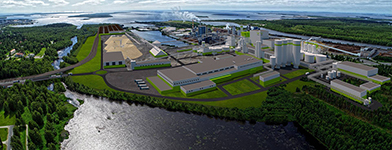Econia and Metsä Fibre, part of Metsä Group, have agreed on consulting services for the prevention of grey economy as well as contractor liability and other compliance matters in Metsä Fibre’s Kemi bioproduct mill project and the Rauma sawmill project. Econia’s comprehensive operating model aims for the seamless management of subcontracting chains and proactive risk management.
Metsä Fibre has made an investment decision regarding the Rauma sawmill and the contract is in full force and effect. Metsä Fibre is to make its investment decision regarding the Kemi bioproduct mill earliest in the autumn of 2020, after which the present pre-contract will be converted into a full supply contract.
New model for the prevention of grey economy
Cooperation between Econia and Metsä Fibre has already started with the preparation of an action and risk management plan for the work against the grey economy. The Kemi bioproduct mill and the Rauma sawmill projects will introduce a proactive anti-grey economy model developed to meet Metsä Fibre’s needs, to be created in cooperation with Econia. The approach is in line with the Finnish Government’s strategy and action plan, adopted on 11 June 2020, for tackling the grey economy and economic crime, with emphasis on prevention, improved information flow and collaboration between public authorities.
“The strength of Econia’s comprehensive operating model is the seamless day-to-day handling of contractor liability matters and the management of subcontracting chains and stakeholder collaboration. Econia helps us to ensure that subcontracting chains comply with laws and collective agreements and that taxes and obligations are handled correctly,” says Sanna Huhtilainen, SVP, Human Resources, Metsä Fibre.
“A grey economy prevention program of this magnitude is yet to be implemented at a construction site. We are honoured to be able to support the world’s most modern sawmill and the largest investment in Finnish forest industry with our expertise. We hope that a similar operating model will become the new industry standard, as only proactive action can prevent the emergence of a grey economy,” says Heimo Alatalo, Econia’s Director, International & HR Services.
The grey economy is best combated by preventive measures
In Metsä Fibre’s operating model, Econia implements contractor liability inspections and regulatory reporting, proactive tackling of the grey economy and related stakeholder collaboration on site, as well as supervision and training of subcontractor chains.
“Seamless management of subcontractor chains already during the tendering stage guarantees proper compliance with regulatory requirements. We perform background checks of subcontractors at the tendering stage and conduct regular compliance and spot checks upon arrival at the site. Mandatory, comprehensive basic training for each subcontractor is enhanced through regular information sessions and training,” Alatalo states.
For further information, please contact:
Heimo Alatalo
Director, Econia
tel. +358 50 527 9444
heimo.alatalo@econia.com
Econia is a Finnish company founded in 1996, which employs more than 100 experts in financial administration and human resource management and international business. Econia operates in 14 locations in Satakunta, Pirkanmaa, Central Finland, Uusimaa and Fuengirola, Spain. Econia’s turnover is approx. 11 M€. The company has shown strong growth in recent years, and the growth forecast for 2020 remains positive, despite the Corona crisis.
Metsä Fibre is a leading manufacturer of bioproducts, biochemicals and bioenergy. The company is the world’s largest producer of pulp and a major producer of sawn timber. In 2019, Metsä Fibre’s net sales totalled EUR 2.2 billion, and the company employs approx. 1,300 people. Metsä Fibre is part of Metsä Group.
The Kemi bioproduct mill would, upon completion, be the largest wood processing unit in the Northern hemisphere. This would be the largest investment in the history of the Finnish forest industry, worth EUR 1.5 billion; the mill would produce 1.5 million tonnes of pulp per year. The construction of the Kemi bioproduct mill will start after the investment decision, which at the earliest can be taken in the autumn of 2020.
The investment value of the Rauma sawmill is about 200 million euros and the new unit’s annual production is approx. 750,000 cubic meters of pine sawn timber. The investment decision for the Rauma sawmill was made in March 2020 and construction is underway.
More information: www.metsafibre.com


